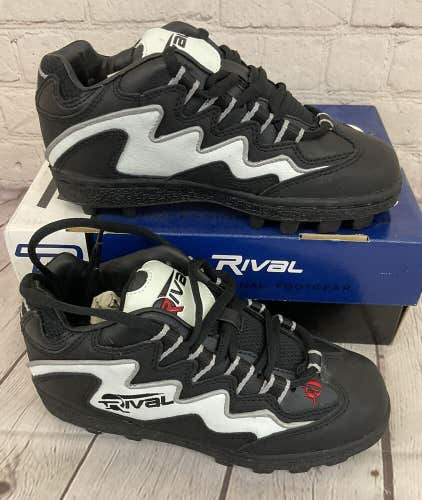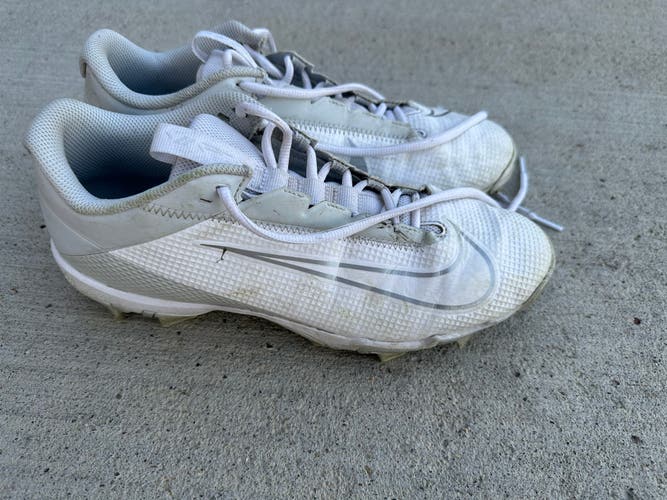- Size 3.0 (Women's 4.0) Football Cleats
- Size 3.5 (Women's 4.5) Football Cleats
- Size 4.0 (Women's 5.0) Football Cleats
- Size 4.5 (Women's 5.5) Football Cleats
- Size 5.0 (Women's 6.0) Football Cleats
- Size 5.5 (Women's 6.5) Football Cleats
- Size 6.0 (Women's 7.0) Football Cleats
- Size 6.5 (Women's 7.5) Football Cleats
- Size 7.0 (Women's 8.0) Football Cleats
- Size 7.5 (Women's 8.5) Football Cleats
- Size 8.0 (Women's 9.0) Football Cleats
- Size 8.5 (Women's 9.5) Football Cleats
- Size 9.0 (Women's 10) Football Cleats
- Size 11 (Women's 12) Football Cleats
- Size 11.5 (Women's 12.5) Football Cleats
- Size 13 (Women's 14) Football Cleats
- Size 14 (Women's 15) Football Cleats
- Size Men's 15 Football Cleats
Related Searches in Football Gear
Top Brands in Football Gear
Football Cleats Frequently Asked Questions
Football players wear cleats so that they can run faster and more easily control their movements. These cleats provide traction on a soft or slippery surface, allowing the athlete to move with greater ease.
There are a lot of differences between football and soccer cleats, but the most obvious one is the shape of their outsoles. Football cleats have thick rubber soles with a stud near the big toe for traction when you push off from a static position. Soccer cleats don't include a midsole, so players can maximize their speed and ball-handling maneuvers. Football cleats do have midsoles to provide much-needed stability and comfort.
Football cleats are made of lightweight materials such as polyurethane and knitted fabrics that aid in breathability and comfort.
While NFL players wear a variety of cleats, Nike is the most popular cleat brand among NFL players, particularly receivers.
High top football cleats increased stability and added ankle support when compared to low top football cleats which provide more flexibility and are of lighter weight allowing for more speed and agility.
Football cleats should not be too tight or too loose, they should fit snug but comfortably. Cleats that fit properly should be comfortable and allow your foot to move and make quick, agile movements. If your cleats are too tight, you risk injury.
History of Football Cleats
Football cleats originated with Henry VIII - despite banning football, the king was recorded as having a pair in his wardrobe as early as 1526! For years, football cleats -- or boots -- were made from leather, with wooden studs. This all changed in 1925, when the Dassler brothers created removable metal spikes. Two years later, the first removable cleats were released by Riddell. Cleat technology continued to advance, as manufacturers prioritized using lightweight materials in order to help players increase their speed. In the 1970s and 1980s, we saw specialty kicking boots and cleats designed for AstroTurf. In the modern day, Nike and Adidas dominate the market with a range of different colored designs and in mid-cut, low-cut, molded cleat and removable cleat versions.
Football Cleats Buying Guide
Football cleats are available in mid-cut, which include an ankle support. Low-cut football cleats resemble soccer cleats, so this style of cleat is usually preferred by kickers (although any position can wear them). Molded cleats are permanently attached to the shoe and are suitable for a range of different types of turf, while detachable, or removable cleats, can easily be removed if you're unsure as to the weather conditions you'll be playing in.
Best Football Cleats
Some football cleat models to take note of in particular include the mid-cut Under Armour UA Highlight cleats, which wrap around your foot like a second skin for comfort and added protection. Adidas' Crazyquick boots are also mid-cut, and a classic option. In contrast, the Adidas Filthyquicks are low cut and are therefore better suited for kickers, or running backs and wide receivers. Also popular among NFL players are the Under Armour Crusher RMs, which have a Die-cut EVA footbed to provide maximum comfort and flexibility. Lastly, we also recommend checking out Nike's Alpha Pro cleat, a 3/4-height cleat that support mobility and also include extra protection for the middle of the foot.

